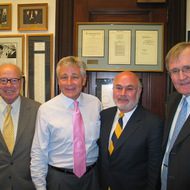GSI President
Jonathan Granoff
A message from the President
Humanity is mastering the energies operating at a subatomic level and has begun to unravel the mysteries of the genetic code. With advances into ever new realms of discovery, capacities for blessing and cursing ourselves as a human community become ever more pronounced.
Will we use this new knowledge to develop new devices to pursue dominance or to advance our common interests? Will we learn how to fuel our economies in new renewable fashions and advance our health and well-being or will we make new exotic weapons?
The firmaments represent a new frontier in which we must answer these questions correctly. As we relate to each other on this earthen sphere, so shall it be reflected above us. There is a framework for ensuring that we do it correctly, and it is based on the rule of law. The Outer Space Treaty emphasizes pursuing security by advancing the common interests of humanity. This standard is consistent with the values contained in the UN Convention on the Law of the Sea, which codifies the principle that the deep sea bed must be considered part of the common heritage of humanity. The pursuit of a cooperative security regime is the underlying vision of both the UN Charter and the nuclear Non-Proliferation Treaty.
We know that to eliminate the challenge posed by nuclear weapons and the crisis arising from their ongoing threat of use, the greatest stimulus to their spread, we must advance cooperation. An arms race in space shreds such cooperation. For that reason, I felt honored to address recently the United Nations Secretary-General’s Advisory Board on Disarmament Matters on the need to prevent an arms race in space.
Bipartisan Security Group member and former US Assistant Secretary of State John Holum has correctly highlighted that the first victim of space weaponization will be the nuclear Non-Proliferation Treaty. We simply cannot permit this to happen.
At the Global Security Institute, we find numerous reasons for hope that the world is indeed ascending to a positive historical moment. We are finding, in unlikely places, an expression of sanity in moving toward a sustainable security system.
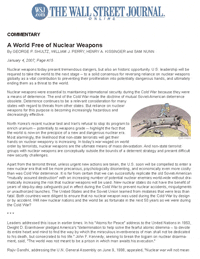 |
|
For example, the currency of nuclear disarmament has been increased considerably by “A World Free of Nuclear Weapons,” the important op-ed by conservative stalwarts George Schultz, Sam Nunn, Henry Kissinger and Willliam Perry. This article puts to rest two serious distortions – nuclear weapons elimination is not pro-American and nuclear weapons elimination is not supported by realists. Moreover, the steps called for by these establishment thinkers overlap considerably with the emerging consensus recommendations being forged through the Middle Powers Initiative (MPI) and its dynamic program, the Article VI Forum. (Read “Towards 2010“, MPI analysis based on the consultations of the Article VI Forum).
Quests for new nuclear weapons, new theaters for weaponization, and new doctrines to mask the pursuit of dominance will not disappear simply by increased sentiments. We must strategically work to promote practical policies with increased clarity and diligence. Through such efforts, and the efforts of many around the world who express the aspirations for peace of the vast majority of humanity, we will achieve a safe passage to a world in which threats posed by nuclear weapons are eliminated, the commons remain free for the use and exploration of all humankind, and security is sustained through a robust global legal regime, enriching the lives of all of us here on Earth.
Sincerely,

Jonathan Granoff
President
Event Report: “Weapons in Space and the Disarmament/Non-proliferation Regime”
 |
L-R: Amb. Grey, Dr. Blix, Mr. Hellgren, Mr. Granoff, Dr. Lewis |
On May 9, 2007, the Government of Sweden sponsored a panel, organized and hosted by the Global Security Institute, entitled “Weapons in Space and the Disarmament/Non-Proliferation Regime,” part of the joint project with the Secure World Foundation to advance a cooperative security regime in outer space. Featuring presentations by Dr. Hans Blix, Chairman of the Weapons of Mass Destruction Commission, Ambassador Robert Grey, Jr., Director of the Bipartisan Security Group, and Dr. Patricia Lewis, Director of the UN Institute for Disarmament Research, the session was a contribution to the delegates of States parties to the nuclear Non-Proliferation Treaty, gathered in Vienna for the first Preparatory Committee meeting of the treaty’s 2010 review cycle. Jonathan Granoff, President of GSI, chaired the panel. Mr. Magnus Hellgren of the Swedish Foreign Ministry provided welcoming remarks.
» Click here for the full report
» Also available in PDF
» Photo Gallery of the event
» Transcript of presentation by Ambassador Grey
» Transcript of presentation by Dr. Lewis
Policy Brief: Advancing a Cooperative Security Regime in Outer Space
Last month, GSI released a new Policy Brief on outer space security as part of its joint project with the Secure World Foundation to advance a cooperative security regime in outer space based on the rule of law.
The brief examines several proposals to advance a security regime in space, including voluntary, behavior-modifying regimes such as a “Rules of the Road” to more comprehensive, legally-binding treaties. It is intended to spark a robust debate within the international community and in Washington on the best way forward to mitigate the dangers posed to our security and ensure outer space benefits all of humankind.
» Click here to read the brief
» Click here to read the BSG Policy Brief, “Weaponization of Space”
» Click here to read “Incompatible Visions: The US Space Command’s Vision for 2020” by Jonathan Granoff and Craig Eisendrath
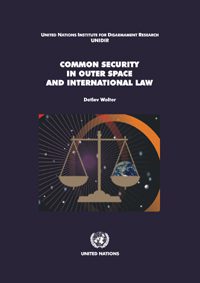 |
Consultation on Outer Space Security Featuring Dr. Detlev Wolter
On April 9, GSI hosted Dr. Detlev Wolter as the guest speaker for an informal consultation on outer space security. Dr. Wolter, Chairman of the 60th session of the General Assembly First Committee on Disarmament and International Security and former Counsellor at the German Mission to the United Nations, discussed the legal foundations and essential treaty elements for a system of common security in outer space. He is the author of the recent book, Common Security in Outer Space and International Law, published by UNIDIR (2007).
» Click here for Dr. Wolter’s presentation summary and book abstract
GSI Presentation to the United Nations Secretary-General’s Advisory Board on Disarmament Matters
On July 18, GSI President Jonathan Granoff presented to the UN Secretary-General’s Advisory Board on Disarmament Matters. In his presentation, entitled “A High Level Panel for Peace in the Highest Places,” GSI recommended that the Secretary-General convene a high-level panel to “help fulfill the aspirations embodied in the Outer Space Treaty to advance the peaceful uses of space for the common interests of all mankind, protect space for peaceful uses, and to prevent an arms race in outer space.”
Dr. John Burroughs, Executive Director of the Lawyers’ Committee on Nuclear Policy, and Felicity Hill, coordinator of the International Campaign to Abolish Nuclear Weapons, also presented to the Board.
In his own statement to the Board, Secretary-General Ban-ki Moon welcomed deliberations on space security: “I also look forward to hearing your advice on the subject of emerging weapons technologies, including those that utilize outer space. In light of the 40th anniversary of the Outer Space Treaty, I am heartened by your discussion of this subject. As I told the Conference on Disarmament earlier this year, the prevention of an arms race in space must remain a high priority for all of us; any such contest would prove a grave blow to the preservation of space for peaceful purposes.”
» Click here to read the GSI presentation
» Click here to read the statement by Secretary-General Ban-ki Moon
» Click here to read the presentation by Dr. John Burroughs, Executive Director of LCNP
» Click here to read the presentation by Felicity Hill, ICAN
» Click here for more information on the Advisory Board
GSI Communiqués: Nos. 1 and 2
The Global Security Institute consistently endeavors to provide relevant, insightful communications to advance the rule of law, the moral imperative to ensure a sustainable future and the elimination of nuclear weapons.
Towards this end, we have begun to release periodic communiqués, replete with links to substantive analysis, op/eds, radio shows, speeches at parliaments and conferences and announcements of other publications by GSI experts and staff.
All Communiqués can be accessed on our website. If you’d like to receive Communiqués directly in your inbox, please contact us.
MPI news
MPI Co-Hosts Historic Conference in Pugwash, Nova Scotia
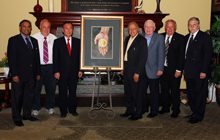 |
|
L-R: MPI Expert Consultant and former Under-Secretary-General Jayantha Dhanapala, Pugwash President Paolo Cotta-Ramusino, GSI Advisor Hiroshima Mayor Tadatoshi Akiba, Professor M.S. Swaminathan, MPI Chairman Douglas Roche, O.C., Ron Joyce and Senator Roméo Dallaire |
On July 6 and 7, the Nobel Prize–winning Pugwash Conferences on Science and World Affairs and the Middle Powers Initiative brought together 25 scientists, diplomats and former military officers from 15 countries for a “Revitalizing Nuclear Disarmament” strategy workshop. The meeting was held near the Thinkers’ Lodge, the site of the first meeting in 1957.
Several high-level current and former decision-makers also addressed the conference. In his opening statement, Canadian Foreign Minister Peter McKay thanked MPI and its Chairman Douglas Roche “for their tireless work to advance nuclear disarmament.”
In a letter delivered by GSI President Jonathan Granoff, former Soviet President Mikhail Gorbachev urged for “a lot of creative thinking” to over come today’s “challenges and opportunities,” facing the international disarmament and nonproliferation regime. He called upon participants to “build an intellectual foundation for agreements that would dramatically cut the arsenals of nuclear weapons on the way to their elimination and prevent an arms race in space. We need your brainpower not just to analyze the problem but to find solutions.”
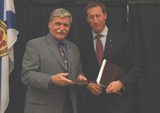 |
|
Senator Roméo Dallaire and Foreign Minister Peter McKay |
» Click here for the speech by Foreign Minister Peter McKay
» Click here for the letter from President Mikhail Gorbachev, GSI Advisory Board Member
» Click here for the GSI Fact Sheet on Negative Security Assurances, the basis of Mr. Granoff’s presentation
» Click here for media coverage and press releases
» More from Pugwash Conferences on Science and World Affairs
» Click here for European Parliament Vice-President’s Press Release, Calling for adherence to the statement from Pugwash
MPI Perspectives on NPT Preparatory Process
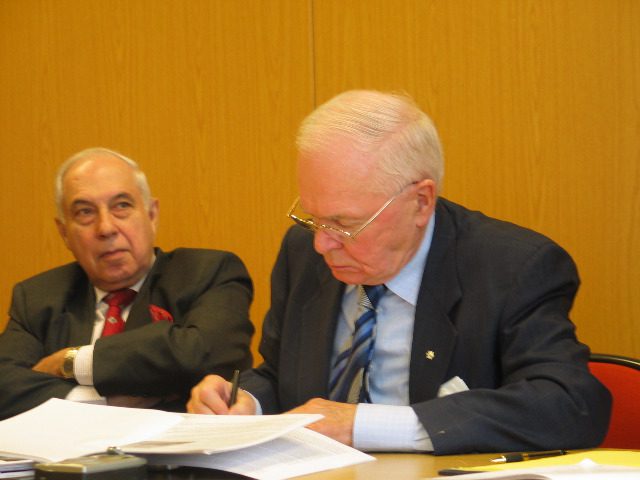 |
|
Ambassador Sergio Duarte and MPI Chairman Douglas Roche |
The Middle Powers Initiative is focused like a laser beam on ensuring a successful outcome to the 2010 Review Conference of the nuclear Non-Proliferation Treaty (NPT). Over the past few months, MPI has undertaken several initiatives as part of its contribution towards building a consensus on ways to strengthen the cornerstone of disarmament, including: holding the fourth consultation of the Article VI Forum (A6F); publishing a briefing paper; submitting analysis to the Preparatory Committee (PrepCom) meeting in Vienna, entitled “Towards 2010”; organizing a panel on May 2 at the NPT PrepCom, featuring Ambassador Sergio Duarte, President of the 2005 NPT Review Conference and newly-appointed High Representative of the UN Office for Disarmament Affairs and; offering an analytic summary of the PrepCom meeting, “Report on a Loosened Deadlock.”
You can find all of these key documents on MPI perspectives on the NPT Preparatory process on the MPI website.
» Click here to read “Forging a New Consensus for the NPT,” the briefing paper prepared for the A6F, Vienna
» Click here for the Executive Summary of the A6F meeting in Vienna
» Click here to read “Towards 2010: Priorities for NPT Consensus” (also available in French)
» Click here for the Event Report from the MPI panel at the PrepCom
» Click here for a Photo Gallery of the MPI PrepCom panel
» Click here to read “Report on a Loosened Deadlock,” the MPI analysis of the PrepCom.
MPI Chairman Douglas Roche presents to the Canadian House of Commons
On May 31, the Hon. Douglas Roche, O.C., delivered a presentation to the Standing Committee on Foreign Affairs and International Development of the House of Commons.
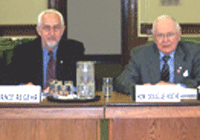 |
|
Mr. Ernie Regehr and Hon. Douglas Roche, testifying to the Canadian House of Commons Standing Committee on Foreign Affairs and International Development |
In his presentation, Senator Roche relayed MPI’s analysis that Canada, and other middle power countries, must provide “stronger political weight… to respond effectively to the present nuclear crisis.”
» Read Senator Roche’s presentation
MPI Expert and PNND Coordinator Presents to the European Parliament
On April 19, Xanthe Hall, member of the Middle Powers Initiative Steering Committee and German Coordinator of the Parliamentary Network for Nuclear Disarmament, delivered a presentation to the European Parliament entitled, “Compliance with NPT Article VI.”
» Click here to read the presentation
Canadian Senator Roméo Dallaire welcomes the work of MPI in a motion in the Senate
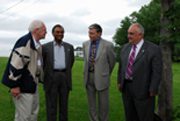 |
|
L-R: Senator Roche, Jayantha Dhanapala, Senator Dallaire and
|
On the 25th anniversary of Canada’s Charter of Rights and Freedoms, Senator Roméo Dallaire presented a motion “urging government to take a leading role in reinvigorating nuclear disarmament.” In his speech, Senator Dallaire praised the work of non-governmental organizations dedicated to nuclear abolition. These NGOs, the Senator said, “have demonstrated an enormous amount of patience, and I applaud them and thank them for staying on and demonstrating that perseverance.” In particular, Senator Dallaire heralded the work of the Middle Powers Initiative and its Chairman, the Hon. Douglas Roche. “On behalf of all Canadians,” Senator Dallaire said, “I salute Senator Roche and his colleagues for their ongoing work and for making us aware of the fact that we are living with the threat not only to our security but also to our fundamental ability to live on this planet, for the planet itself is at risk.”
» Click here to read the speech by Senator Dallaire
MPI Presentation at Moscow Conference
On June 29, Jonathan Granoff delivered a speech on the role of “the Middle Powers Initiative and Alternative Multilateral Approaches,” at a conference in Moscow entitled “Lessons Learned from Non-Proliferation Failures and Successes”. The conference was co-organized by the International Federation for Peace and Conciliation, the Hudson Institute, the Science Programme of the North Atlantic Treaty Organization (NATO), the Center for Political and International Studies, and the Center for Euro-Atlantic Security of MGIMO University.
 |
Dr. Rebecca Johnson |
Dhanapala, Johnson Named MPI Expert Consultants
MPI is pleased and honored to announce the appointment of two of the most distinguished figures in international arms control issues as Expert Consultants to MPI.
 |
Ambassador Jayantha Dhanapala |
Ambassador Jayantha Dhanapala, the former UN Under-Secretary General for Disarmament Affair and commissioner on the Weapons of Mass Destruction Commission, and Dr. Rebecca Johnson, the Executive Director of the Acronym Institute for Disarmament Diplomacy and Editor of the Institute’s journal Disarmament Diplomacy, will lend their expertise to MPI as it enters a new phase in its work to help revitalize the nuclear disarmament and non-proliferation agenda as embodied in the Nuclear Non-Proliferation Treaty (NPT).
The contributions of Ambassador Dhanapala and Dr. Johnson will be invaluable in furthering this work. The Chairman of MPI, Hon. Douglas Roche, O.C., said in making the announcement, “The vast experience of Jayantha Dhanapala and Rebecca Johnson, two world-respected figures, will bring added depth to the work of the Middle Powers Initiative as we focus on ways to save the Non-Proliferation Treaty at the Review Conference in 2010.”
» Click here for more information, including biographies of Ambassador Dhanapala and Dr. Johnson
BSG news
 |
L-R: Dr. Hans Blix, Senator Chuck Hagel (R-NE), Jonathan Granoff, Amb. Thomas Graham |
GSI/BSG/WMDC events in Washington
On May 3 and 4, 2007, a delegation comprised of Ambassador (Ret.) Thomas Graham, Jr., Chairman of the Bipartisan Security Group, Jonathan Granoff, President of the Global Security Institute, and Dr. Hans Blix, Chairman of the Weapons of Mass Destruction Commission, advocated timely policies on international security in the US Congress and to the International Law Section of the American Bar Association.
The Congressional Bipartisan Task Force on Non-proliferation, co-chaired by Congressmen Ed Markey (D-MA) and Christopher Shays (R-CT), presented the BSG/GSI/WMDC delegation for a discussion entitled, “Nuclear Weapons: Resolving Iran, Reviewing Iraq.”
 |
|
The GSI/BSG/WMDC delegation meeting with Senator Bob Casey
|
The event was covered by Fox News and was posted prominently on the homepage of Congressman Markey’s website. (A cached page of Congressman Markey’s remarks can be found here.)
» Click here for the event report
» Click here for a photo gallery
BSG Congressional Testimony Record Released
On September 26, 2006, GSI Advisor Frank von Hipple, GSI President Jonathan Granoff and BSG Chairman Ambassador Thomas Graham testified before the House Subcommittee on National Security, Emerging Threats, and International Relations, on the topic of Weapons of Mass Destruction: Current Nuclear Proliferation Challenges.
The official testimony has just been released and is now available on the GSI website. We believe that the testimony not only provides a wealth of important information from non-proliferation and disarmament advocates but also from the representatives of the Administration and “conservative” think tanks, thus giving a fair hearing to differing points of view.
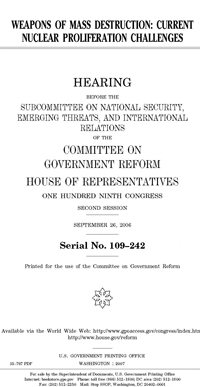 |
» Official Testimony Part I
(Includes statements by House Rep. Shays and Waxman, & Dr. Blix)
» Official Testimony Part II
(Includes statements by US Dep. Asst. Secretary of State Andrew Semmel, US Dep. Asst. Secretary of Defense Jack David, & Amb. Graham)
» Official Testimony Part III
(Includes statements by Jonathan Granoff, Baker Spring, & Henry Sokolski)
DPE news
Presentation to the Organization of American States
On March 15, GSI President Jonathan Granoff delivered a speech entitled “Cooperative Security” to the Organization of American States (OAS) in Washington, DC, at a meeting hosted by the OAS Chairman, Javier Sancho-Bonilla, the Permanent Representative of Costa Rica.
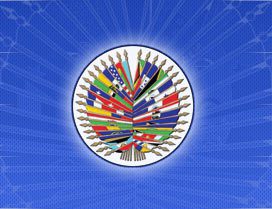 |
In his presentation, Mr. Granoff discussed the challenges to the NPT, the voting trends of the United States in the United Nations General Assembly, and the need for a cooperative security approach to outer space, as well as to the challenges on earth. He urged “modest steps” towards strengthening our multilateral security regime, based on the recommendations contained in the Middle Powers Initiative policy brief, “Towards 2010.”
» Click here for the full text of Mr. Granoff’s remarks to the OAS
Back to top
PNND news
Celebrating the 20th Anniversary of New Zealand’s Nuclear Weapon Free Zone Status
To mark the 20th anniversary of the passing of New Zealand’s nuclear free legislation, the Parliamentary Network for Nuclear Disarmament (PNND) invited members of parliament from across the political spectrum to appear on the steps of Parliament wearing Nuclear Free Aotearoa-New Zealand ‘T’ shirts and/or badges.
 |
Hon Phil Goff and Green MP Keith Locke surrounded byGreen, Labour and National MPs
|
On this anniversary, the New Zealand Parliament held a debate on its nuclear-free policy, with active engagement and support from PNND. PNND member and Minister for Disarmament and Arms Control, Phil Goff—who is also New Zealand’s Trade Minister and Defence Minister—successfully introduced a resolution in the house.
» Click here for a text of Minister Goff’s statement
PNND New Zealand section secretary Keith Locke also spoke and tabled (introduced into the house) the Nuclear Weapons Convention and “A World Free of Nuclear Weapons,” the op/ed piece by Shultz, Kissinger, Nunn, Perry.
During his visit to New Zealand, the Dalai Lama thanked New Zealand for its nuclear free policy. PNND Global Coordinator Alyn Ware met with the Dalai Lama and presented him with supportive documentation on nuclear abolition, including the Nuclear Weapons Convention and Securing Our Survival: The case for a nuclear weapons convention.
For more recent activities from PNND, see the PNND Newsletter.
Other
Secretary-General Ban Appoints High Representative for Disarmament 
The Global Security Institute would like to congratulate Ambassador Sergio de Queiroz Duarte of Brazil, who was appointed by Secretary-General Ban ki-Moon as the High Representative for Disarmament at the Under-Secretary-General level.
Mr. Duarte is a career diplomat and holds the rank of Ambassador in the Brazilian Foreign Service, where he has served for 48 years. His diplomatic appointments include the Embassies of Brazil in Rome (1961-63), Buenos Aires (1963-66) and Washington 1970-74), in addition to the Permanent Mission in Geneva (1966-68), where he was a member of the Brazilian delegation to the Eighteen-Nation Disarmament Committee, the precursor to today’s Conference on Disarmament.
In 2005, Ambassador Duarte was elected President of the VII Review Conference of the Parties to the Treaty on the Non-proliferation of Nuclear Weapons (NPT), in New York. During his career, he attended 12 sessions of the First Committee of the UN General Assembly in different capacities and 6 sessions of the United Nations Disarmament Commission (UNDC). During his career, Ambassador Duarte represented his country at many other international meetings and attended several seminars in the field of disarmament, arms control and non-proliferation.
The Global Security Institute extends its most heartfelt congratulations to Mr. Duarte, whose credentials, experience and commitment to the issue will enrich the work of the Office for Disarmament Affairs, and we look forward to working with him in his new capacity.
New Books by GSI Leadership
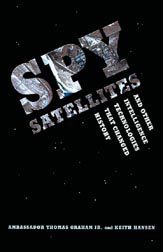 |
BSG Chairman Ambassador (Ret.) Thomas Graham, Jr., published a new book entitled, “Spy Satellites and Other Intelligence Technologies That Changed History.” The book, co-authored with Keith Hansen, an international relations professor at Stanford University, focuses on the role that intelligence-collection systems play in promoting arms control and disarmament.
Together, these two authors bring more than fifty combined years of experience to this discussion of the capabilities of technical systems, which are primarily based in space. Their history of the rapid advancement of surveillance technology is a window into a dramatic reconceptualization of Cold War strategies and policy planning. Their important insights shed a much-needed light on the process of verifying how the world harnesses the proliferation of nuclear arms and the continual drive for advancements in technology.
 |
GSI Development Director Craig Eisendrath co-authored a new book, War in Heaven: The Arms Race in Outer Space, with Dr. Helen Caldicott. In War in Heaven, a Nobel Prize-nominated peace activist and a former US foreign service officer (who helped write the Outer Space Treaty of 1967) look at the history of military uses of space and the current plans for “militarizing the heavens,” including kinetic, laser, nuclear bombardment, and anti-satellite weapons. Contrary to the claims of Secretary of Defense Donald Rumsfeld that the United States faces a “space Pearl Harbor,” Caldicott and Eisendrath show that the United States itself is today the principal obstruction to passage of an international treaty banning weapons from outer space.
» Click here for more information on Spy Satellites
» Click here for more information on War in Heaven: The Arms Race in Outer Space
» Click here for more information on other books by GSI leadership
![]()

